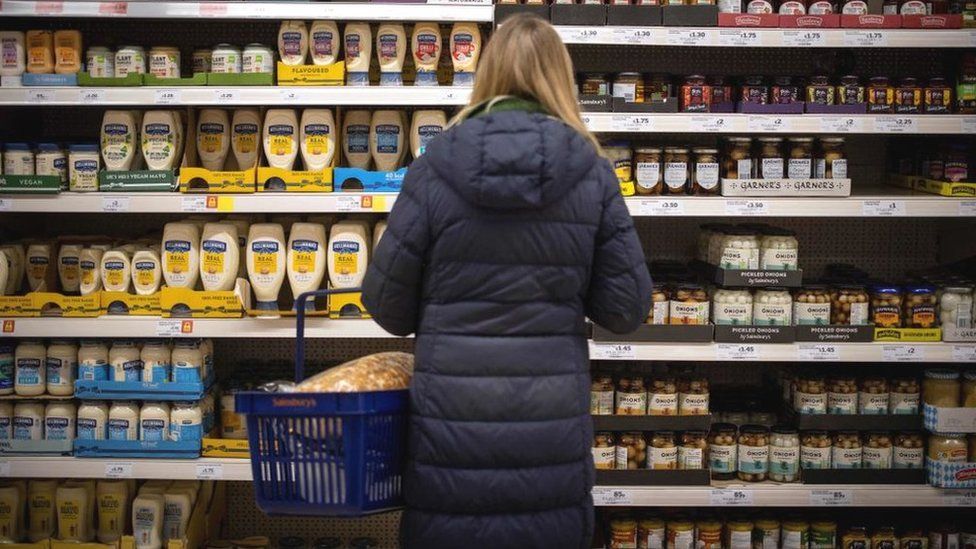
Rishi Sunak has been accused of not doing enough to help the poorest as the cost of food and energy increases at its fastest rate for 30 years.
The Resolution Foundation and Institute for Fiscal Studies think-tanks said Mr Sunak could have done more to protect those hit hardest by rising costs.
The chancellor insisted he would help "hard-working British families" through the "challenging months ahead".
Boris Johnson also hinted more help for people struggling was on its way.
"The cost of living is the single biggest thing we're having to fix, and we will fix it," the prime minister told LBC Radio, adding: "As we go forward, we need to do more".
It comes as the government's own forecasters, the Office for Budget Responsibility, said UK households faced the biggest drop in living standards since records began in the 1950s.
This video can not be played
To play this video you need to enable JavaScript in your browser.
Mr Sunak sought to address the rising cost of living in his Spring Statement on Wednesday, cutting 5p from fuel duty and taking some of the sting out of April's National Insurance rise by increasing the point at which workers have to start paying it.
But the Institute for Fiscal Studies' (IFS) director Paul Johnson said the measures announced by Mr Sunak "will still not be enough to protect poorer households from a significant hit to their living standards".
He said that the 3.1% planned increase in benefits compares to an inflation rate, which tracks how the cost of living increases over time, now expected to average nearly 8% over the year.
"The inflation rate experienced by poorer households will be even higher than that," he added.
"While benefit levels will catch up with inflation next year, that will be of little comfort to those budgeting week to week or to those who are unemployed this year but not next year.
"It is hard to understand the lack of action on this front."
New analysis from the Resolution Foundation also suggests that 1.3 million more people would be pushed into "absolute poverty" from April.
Its estimate includes 500,000 children. It's defined as having an income less than 60% of the middle-earner in 2010-11.
That would bring the total number of people classed as being in absolute poverty to 12.5 million, the biggest rise seen outside of a recession.
Torsten Bell, its chief executive, said: "It means we're all getting worse off, and at the bottom end you're having to cut essentials because you don't have lots of luxury spending to go in the first place. I think that is really serious."
This video can not be played
To play this video you need to enable JavaScript in your browser.
Mr Bell pointed out the changes would provide "some help" to families on higher and middle-incomes.
But he added: "It means we're all getting worse off, and at the bottom end you're having to cut essentials because you don't have lots of luxury spending to go in the first place. I think that is really serious."
Mr Sunak also used Wednesday's statement to promise to cut 1p in the pound from income tax by the next general election in 2024, when he said the UK economy would be in better shape than it is now.
Labour's shadow chancellor Rachel Reeves said Mr Sunak had failed to understand the scale of the cost of living crisis.
"I think most people are looking at their pay packets now and looking at their taxes, and saying these promises in the future are not going to help me pay these bills this year," she told the BBC.
"I was incredibly surprised that the chancellor didn't do anything yesterday with rising gas and electricity bills, when the profits being made by North Sea oil and gas companies are at near-record highs."
This video can not be played
To play this video you need to enable JavaScript in your browser.
Mr Sunak insisted the measure he announced on Wednesday would protect the most vulnerable.
"It's absolutely right we support people on the lowest incomes. I'm confident that the policies we put in place are doing that," he told Today.
He insisted that the energy bill rebate announced recently would also "help people meet the rising price of energy", when the price cap changes in April.
Asked if he would provide further help with energy bills before October, he said: "We will have to see where we are in the autumn."
The OBR's latest forecast predicted that inflation, which measures the change in the cost of living over time, is set to hit a 40-year high of 8.7% in the final three months of 2022.
Rising prices and tax hikes mean living standards will not recover to their pre-pandemic level until 2024-25, it said.

How is the cost of living crisis affecting you? Share your experiences by emailing haveyoursay@bbc.co.uk.
Please include a contact number if you are willing to speak to a BBC journalist. You can also get in touch in the following ways:
- WhatsApp: +44 7756 165803
- Tweet: @BBC_HaveYourSay
- Upload pictures or video
- Please read our terms & conditions and privacy policy
If you are reading this page and can't see the form you will need to visit the mobile version of the BBC website to submit your question or comment or you can email us at HaveYourSay@bbc.co.uk. Please include your name, age and location with any submission.
https://news.google.com/__i/rss/rd/articles/CBMiLGh0dHBzOi8vd3d3LmJiYy5jby51ay9uZXdzL2J1c2luZXNzLTYwODU4MTEz0gEwaHR0cHM6Ly93d3cuYmJjLmNvLnVrL25ld3MvYnVzaW5lc3MtNjA4NTgxMTMuYW1w?oc=5
2022-03-24 11:56:12Z
CBMiLGh0dHBzOi8vd3d3LmJiYy5jby51ay9uZXdzL2J1c2luZXNzLTYwODU4MTEz0gEwaHR0cHM6Ly93d3cuYmJjLmNvLnVrL25ld3MvYnVzaW5lc3MtNjA4NTgxMTMuYW1w
Tidak ada komentar:
Posting Komentar